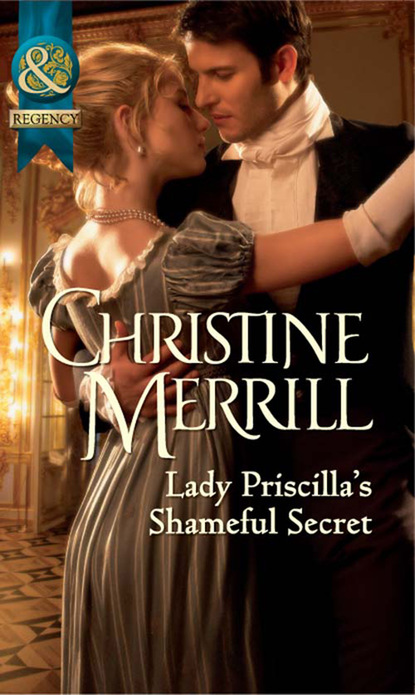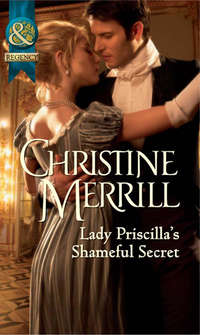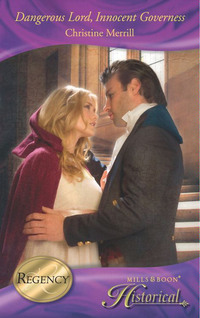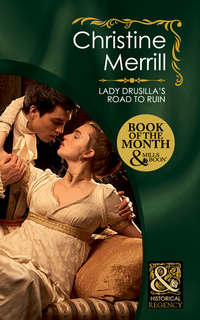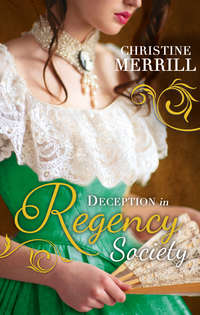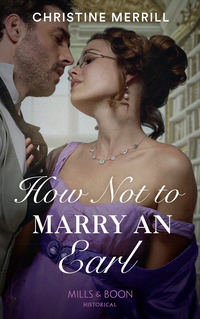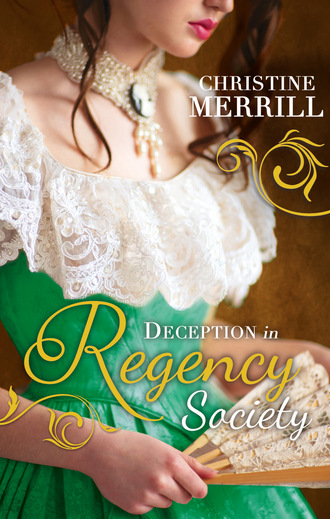
Полная версия
Deception in Regency Society
And how could she tell him that she could not bear to? The memories of Robert were still fresh in her mind. The knowledge that the servants were no longer hers to command, and that she could, and should be, displaced when Freddy took a wife of his own—she tried not to shudder at the thought.
‘You know I must not, Freddy. It is no longer my place. It would be far better were you to find a wife to take the house in hand.’
He scoffed. ‘Settle down so soon? Surely there is time for that later. I am just learning to enjoy the advantages of the title. A wife would spoil it all.’
She dreaded to think what advantages he had discovered that would be so hindered by a wife. ‘It is your duty, you know,’ she reminded, as gently as possible.
Freddy shook his head like a stubborn child. ‘All you ever talk of is duty, Aunt Constance. There is more to life than doing one’s duty.’
‘Duty is much a part of your position, Freddy. You have a responsibility to your King, to your tenants, to your servants.’ She hoped that the responsibility to herself was implied, and that he would not make her beg for her allowance.
‘Well, yes. I suppose. But Parliament is not currently in session. So there is one thing I needn’t worry about. And the tenants take care of themselves, for the most part.’
She resisted the urge to point out that they never seemed to manage it, when her husband was alive. ‘But there is still the matter of the collecting of rents, and the paying of bills, and making sure that all your financial obligations are met.’ And there was a broad enough hint, if he cared to take it.
‘But it is a tiresome business to worry over every little detail, when the sun is shining and one is aching for a gallop.’ Although Freddy’s dirty boots had come home, his mind was still on horseback in the park.
‘An estate manager, or man of business, can take care of such things. It would leave you with less to worry about.’
‘But, Aunt Constance, I am not worried now.’ As Freddy smiled, it was evident that her financial problems had in no way touched him. ‘And being duke is not so hard as all that, I’m sure. With a little practice, I can manage the estates on my own, just as Uncle Robert did.’
Constance fought the urge to inform Freddy how distant his abilities were from those of his uncle. She took a deep breath, and tried a different way. ‘I am sure you are right, Freddy. Once you have held the title for a while, you will have everything set to rights. But I must admit, right now, that I was rather hoping we could deal with the part of the estate that concerns my allowance. It worries me greatly, that I have not received this month’s cheque, and in the past, the amount—’ she took another breath and rushed through the next words ‘—has not been sufficient to cover expenses.’
‘You know,’ said Freddy, as though the thought had just occurred to him, ‘that if you were to live in the dower house of the manor, your expenses would not be so very great.’
‘They are not great now, I assure you. I have made what economies I can.’ A year of mutton instead of lamb, and no shopping, and cuts in staff had done nothing to make the income match the outflow.
‘But really, Aunt Constance. Be sensible. If you were to leave London and return to the country, I need not give you any allowance at all.’ He was smiling as though he had found the perfect solution.
‘That is not technically true, Freddy,’ she said. ‘I still must eat. And pay my maid. And there are dresses to buy, carriages to hire, small entertainments…The only way you will be free of the expense of me is when I remarry and my upkeep falls upon my husband.’
He stared at her as though the idea had never occurred to him. ‘Surely you do not mean to remarry so soon, Aunt Constance.’
‘On the contrary, Freddy, I find it a most respectable choice. I am sure that Robert would have had no problem with it. He said as much to me, when he was alive. And he always meant me to set up housekeeping in town, in hopes that I might meet someone suitable, and not be too much alone. For that reason, he deeded me the house in Grosvenor Square. Speaking of which…’ she eased the conversation towards her next request ‘…if possible, I would like to take the deed away with me today, to give to my bankers.’
Freddy’s brow furrowed. ‘I never saw the logic in Uncle Robert’s deeding the house to you, Aunt Constance. It is too much responsibility for a woman, in my opinion. As I told you before, you are welcome here, or in the dower house, in Sussex. It is very nice.’
She had to hide her annoyance before continuing. ‘I have no doubt it is a nice house, Freddy. I decorated it myself, for Robert’s mother. And I have no problem staying in it. When I visit,’ she said, slowly and clearly. ‘But I have no wish to move back to Sussex. Robert meant for me to be out in London, after he died, mixing freely with society.’
‘But why must it be London? Society in the country was quite good enough for you before.’
‘Although the country life is most pleasant, I know the gentlemen in the neighbourhood, and can assure you there is no one to suit me, in regards to matrimony. I am not likely to meet a husband if I cloister myself in the dower house.’
‘If you are there, where I can keep an eye on you, I can advise you, if and when it comes to the matter of your marriage.’
If and when she married? ‘Freddy,’ she said, struggling to maintain her temper, ‘I am not a child that needs advice in this matter. I am a full six years older than you, and will know a good match when I see it. I do not need your advice, or your permission.’
‘But you do need my money,’ he pointed out, petulantly.
‘Not for so very much longer, I hope. I am endeavouring to be out of your hair and your pocketbook with as much expedience as I can manage. But you need to help me in this, Freddy.’ She softened. ‘Please. If you will give me my allowance, I can pay my bills and will not bother you again for quite some time. Perhaps never. If you give me the deed, I can dispense with the house, and move to simpler accommodations. It will mean less expense for both of us.’
Freddy looked uncomfortable. ‘The deed is fine where it is. I really do not see the need to bother you with the care of it.’
‘Oh, it is no bother, Freddy,’ she assured him. ‘It makes sense, does it not, to keep it with the rest of my papers? And it will be one less thing you need to keep track of.’
His eyes darted around the room, as though looking for some excuse to escape the conversation. ‘I mean…really, Constance, you cannot expect me to lay hands on the thing, on such short notice.’
‘Freddy, it is not short notice at all. I have asked you for it for the better part of a year. Please can you not go into the study and bring it to me? Then I will be gone and you need not hear me ask again.’
‘Well, the truth is, Constance…’ Freddy looked more than uncomfortable, now, and had to struggle to meet her gaze ‘…the truth is, I have lost it.’
‘Do not be ridiculous, Freddy. I know it lies in the safe, in my husband’s—I mean, in your study. You could get it for me now, if you wished.’
‘Constance, you do not understand.’
‘Clearly I don’t, Freddy. Let us go to the study, now. I will show you where it is.’
His voice was lower, almost hard to hear, and he was looking at the ground. ‘It is no longer in the safe, Constance. As I told you, I lost it.’
‘Well, then let us go and search for it. It is probably among the papers in your desk.’ She could not resist a reproof. ‘Although it might have been wiser to never have removed it from the safe. It would have saved the bother now.’
‘At cards, Constance.’ He said it loud and looked her straight in the eye. ‘It is not on the desk, or anywhere else in the house. I lost it at cards. I was in my cups, and in deep play. And I am a little short of cash, until the next rents are collected.’
‘And so you paid your debt with a thing that does not belong to you.’ She looked at him in horror, as she realised just how bad things had become.
She no longer bothered to contain her temper. ‘I come here at my wits’ end, without a penny in my pocket, and you berate me for the high price of my keeping. You tell me I only want your money. As I see it, Freddy, I do not need your money nearly so much as you needed mine. You took the only thing I had that truly belonged to me and you gambled it away. And you did it because you are too busy drinking and gaming and whoring to be bothered to collect the rents on your properties, which you need to do to keep the coffers full. And now you think you can force me back to the country to play housekeeper to you, while you destroy everything my husband worked so hard to build.’
‘I am the duke now,’ he shouted back, although he sounded more like a spoiled child than a peer of the realm. ‘Not your husband. I do not have to take advice or listen to you criticise my methods. I can do as I please.’
‘Then you do not understand what it means to be a duke. Not a good one, at any rate,’ she snapped.
‘Good or bad, Aunt Constance, it would serve you to do as I say, for I am head of your family now. Uncle Robert was a fool to give you as much freedom as he did, for you seem to think that you can do just as you please, and answer to no one. I am glad that the deed is gone, and I no longer need hear you whine for it. It is time that this stupidity of maintaining an expensive residence in London is brought to a halt, and you are brought to your senses.
‘And with regard to your allowance—you will have no more money from me, not another groat, until you come to your senses and move to the dower house at Wellford, where you belong.’
Chapter Five
At the door of the ballroom in Barton’s home, Constance greeted her guests with a frozen smile. If she could manage to control nothing else around her, she could at least control her temper for the few hours necessary to earn back her necklace.
She had pleaded with Freddy to see reason, and he had all but thrown her from his house. He would not even tell her who held the deed to her own home, and she was left to wait for a knock at the door, politely explaining that she must pay rent or vacate the premises.
And tonight she must dance to Barton’s tune, if only to retrieve the necklace and sell the stones again. The rubies would mean another month’s income, perhaps two. Or even more if she was forced to reduce her staff and move to a smaller place.
But it did no good to think about what might come, if there was a more immediate problem to deal with. Until she had the rubies in hand, she must keep a tight rein on her emotions, and give Barton what he wanted. To that end, she made sure that she looked her best, and was ready when the carriage he’d sent for her arrived. Her gown was not new, but she had not worn it in over a year. Susan had retrimmed the deep blue satin with silver lace, and dressed her dark hair with silver ribbons.
Constance was afraid to wear the necklace that best suited the gown lest someone recognise the sapphires as paste, and settled for the pearls. And she made sure that there was enough empty space in her reticule to carry away the rubies, should Barton be true to his word and return them to her.
Of course, if he did not, she would feel most foolish for being rooked into attending the evening’s affair. But it would be a small loss, and the trick would not work twice. If she did not have the rubies at the end of the evening, she would reconcile herself to whatever might result from Barton’s revelation.
But at the moment she was trapped in the receiving line next to a man she detested, and forced to entertain his guests as if they were her own. She smiled politely at the man bent over her hand, smiled at his wife as well, and responded to their greetings by rote, as she had to hundreds of guests at parties she had thrown for Robert. Her smile brightened as she noticed them to be strangers. Barton was not privy to the first circle of the ton. Many of her closest friends recognised the man for what he was and declined the invitation, or cut him outright. Constance wholeheartedly regretted that she had been slow to see his true character, but she was not alone, for the ballroom was full of people willing to befriend him.
She looked past the next man in line, barely hearing Barton’s introduction of him, and scanned the crowd. Of course, a fair portion of the guests were social climbers, cits and hangers-on. But after this evening, she need never see them again, and they certainly would not be in a position to go gossiping to her friends about seeing her here.
‘Mr Smythe, the Dowager Duchess of Wellford.’ She winced. Barton insisted on using her title to his friends, as though he wished to make sure that everyone knew the value of his new possession.
The man before her bowed low over her hand. ‘Your Grace.’
Although his face was unfamiliar, his voice struck a chord of memory. There was laughter in it. And the touch of his hand on hers was at the same time, ordinary and intimately familiar.
It was the thief from her bedroom.
He rose from his bow and looked into her eyes for a fraction of a second too long, as though daring her to speak and knowing she could not. His eyes were hazel and sparkling from the shared conspiracy, his smile was broad and a trifle too intense for a common introduction. If it were another man, she might think he had arrived half-foxed and up to mischief. But this man had already proven to be more than he appeared. If he meant to cause trouble, she doubted he would blame an excess of wine.
‘Mr Smythe?’ That was what Barton had said, had he not? She could not very well ask him to repeat himself, or demand to know how he knew Smythe. To express too much interest in a male guest was not the quickest way back to her necklace.
Of course, she could wipe the familiar grin from Smythe’s face, and prove to him that she recognised him. A casual word could ruin him just as quickly as it could her. She opened her mouth.
And perhaps he would ask about the money she’d stolen from him or the kiss he’d stolen in her bedroom.
She closed her mouth again, and pasted on a delighted smile. ‘How do you do, Mr Smythe.’
‘Quite well, thank you.’ She could swear he winked at her.
And then, he was gone.
If Barton had noticed anything pass between them, he said nothing. And soon the guests were through the line and Barton led her out in the first dance of the evening.
She moved through the patterns as if sleepwalking, speaking to her partner only when she could not avoid it. He danced with her several more times, when she could not manage to dodge his attention, and she maintained the same demeanour: polite, cordial and distant. Nothing that might make the guests assume there was anything of a more intimate nature likely to happen between them in the future.
And while she held Barton at a distance, she also managed to avoid contact with the curious Mr Smythe. It was possible that she had imagined recognising him. Perhaps she had been wrong. She could not very well ask him about it in a crowded ballroom.
But she was sure she was not mistaken. He was the thief. She had seen the recognition in his eyes. And she was somewhat frustrated to realise that it was not to be the least like she had fantasised, with him carrying some burning desire to see her again. She thought she could feel him, observing her from across the room, but this might be her imagination as well. He made no attempt to contact her; when she looked in his direction, he was always looking elsewhere. He seemed to care very little that she was in the room at all.
She was relieved when it finally came time for supper. Barton led her into the dining room, and her position as hostess meant that she was seated at the far end of the table from him. But nowhere near Smythe, either. The people around her were unexceptional, and she relaxed for a time, chatting amiably with them before the meal ended and she had to gather her wits and return to the dance floor.
When she reached the ballroom, she took care to get lost in the crowd and separated from her host. The next dance was a waltz, far more intimate than she liked, if she should have to dance with Barton. If she could find another partner quickly, it would be several minutes before she need speak with him again. She searched the room. Quickly, someone. Anyone.
‘Your Grace, may I have this dance?’
She’d said yes to the man before even turning to face him. And when she looked up, it was into the smiling eyes of Mr Smythe.
He saw her discomposure and said nothing, taking her hand and leading her out on to the floor.
As the music began, any doubt that he was the man from her bedroom disappeared. He held her as he had held her that night, in a grasp that managed to be both relaxed and intimate. It felt good to be in his arms again, and to be able to admire him in the candlelight.
And there was much about him that was admirable. His hair was brown, and had an appealing softness to it. She remembered how it had felt when she’d touched it, and wanted to touch it again. He had pleasant, even features, and the smile on his lips gave every indication of breaking into a grin, given the slightest provocation. His eyes were bright with suppressed mirth. If his profession left him racked with guilt, there was no indication of it, for he seemed a most happy fellow.
They danced in silence, until at last he leaned a trifle closer and whispered, ‘How long do you suppose we can pretend a lack of recognition to each other? We have managed quite well so far, I think. Longer than I expected. But one of us has to break eventually. I surrender. You have won.’
‘I don’t know what you are talking about.’
‘And now you are taking the game to extra innings. Not necessary. I am conquered. Vanquished. You nearly had me in the receiving line, you know. Finding you there, next to Barton, was a nasty surprise.’
‘You will survive it,’ she responded tartly. ‘Seeing an acquaintance unexpectedly in a public place is not nearly so shocking as finding a total stranger in one’s private rooms.’
‘Touché. But I had hoped you had forgiven me for that. Why so cold to me now?’
‘Perhaps I don’t approve of people who take things that don’t belong to them.’
‘Oh, really? But I notice, when you were in need, that you had no problem keeping the money I left for you.’
So he had left it for her. But did he expect thanks for involving her in a theft? ‘That was different. What else was I to do with it? I had no idea—’
‘Where to find me and who the money belonged to. And you were in desperate need, so you took it. Believe me, I understand completely.’
‘I will pay you back when I am able,’ she said.
‘You will pay me back tonight,’ he replied.
Her heart sank. He had seemed so nice. And he had promised not to compromise her. Now he would become just another man with a hold over her, and he would use it to his advantage like all the rest. She stumbled as they turned.
He caught her, incorporating the misstep gracefully into the movement of the dance. ‘Oh, do not give me that melodramatic look. We are in a ballroom, not Drury Lane. I have no intention of asking you to whore yourself to me. I merely need you to keep your lover, Barton, occupied while I go to search his study.’
‘He is not my lover,’ she retorted.
‘Really? But you stand as hostess, at his side.’
‘It was not my desire to do so.’
‘And you have been seen often in his company.’
‘For a time,’ she corrected, ‘but no more after tonight. He is nothing singular. I have been seen in the company of many men.’
His eyebrow arched suggestively.
‘I am in your company now. But that does not mean I would invite you to my bed.’
Of course, if he wished to be there, he would hardly require an invitation. She would be quite helpless to stop him, and perhaps next time he would wish to steal more than a kiss. Once the thought was formed, it showed no intention of fading.
He was staring at her again, noticing the gap in the conversation. And his smile was definitely a grin. She wished she had not mentioned the bed at all, for if he did not have the idea before, he must surely be thinking of it now.
She cleared her throat. ‘What I meant to say was, I hope to marry again, and that means I am likely to be seen in the company of gentleman who I think might be of a mind to take a wife.’
‘And you chose Barton as a possible husband?’ Smythe’s tone was incredulous and the smile disappeared from his face.
‘I sometimes find that the interests of gentlemen are less than worthy. It is a tribute to my naïveté and not my lowered standards.’
‘So you and Barton are not…?’ He spoke a trifle too hastily and his hand tightened on her waist.
‘He made an offer that had nothing to do with matrimony, and I gave him a set-down. More than once.’ She frowned. ‘At the end of the evening I will probably have to give him another, since he ignored the others. And he tricked me into coming here, for reasons I’d rather not discuss.’
He blinked down at her and his hand relaxed. He was holding her in the same loose grip as before, as though he was confident that she would stay with him, even if he had no hold on her. ‘Well, then. Perhaps I was misinformed.’
‘Most definitely you were.’
He looked bemused. ‘Then I hope you will not think it too rude when I will ask you to keep the man who is not your lover, though he seems to think he will be, occupied while I pay an unaccompanied visit to his study.’
‘And how do you expect me to do that?’
‘Use your imagination. A quarter of an hour is all I need and easily worth the hundred guineas I left in your room.’
The dance came to an end and he led her from the floor. ‘Your Grace, it was an unexpected pleasure. Now, if you will excuse me?’ There was the slightest inclination of his head, which seemed to hint that he had business to attend to, and that the clock was ticking.
She glanced across the room, and somewhere in the distance a clock chimed the three-quarter hour. Very well, then. She would give him fifteen minutes. It was a small price for the money he had given her. She glanced around the room, searching for Barton, and saw him too close to the stairs that must lead to the study. ‘My lord?’ She had hoped to ask him to dance, and out of the corner of her eye, noticed that the orchestra had chosen that inopportune moment to take refreshment. Very well, then. It was near enough the end of the evening. Now was as good a time as any to retrieve the necklace. ‘If I might speak to you?’
‘Certainly, my dear.’ He bowed low over her hand. ‘What is it?’
She resisted the urge to inform him that she was not now, nor ever wished to be, his dear. ‘In private.’
‘My study, then.’ He turned to lead her to the exact place that she did not wish to be.
‘Not so private as all that, I think. The garden, perhaps? It is quiet enough there.’
‘And most romantic in the moonlight.’
She bit back another retort. There would be time enough in fifteen minutes to set him straight.
He took her hand and led her to the balcony doors, and, at the back of her mind, she felt a minute pass. And another, as he led her outside, and down the stone steps to the garden. When they were in the darkness and a distance from the house, he turned to her and smiled. ‘To what do I owe this sudden desire to be alone with me? Have you reconsidered my offer?’
‘You know very well the reason. Have I performed to your satisfaction in this little farce?’
‘Most admirably. We can make it a regular occurrence, if you wish.’
‘But I do not wish,’ she said firmly. ‘I have told you over and over again.’
‘And yet, you agreed to do it tonight. And it was a delightful evening. Not so terrible as you made it out to be, I’m sure.’
‘There was only one reason I agreed to come, and you know it full well.’
‘Ah, the necklace.’ He reached into his pocket, and produced the rubies, holding them in front of her.



